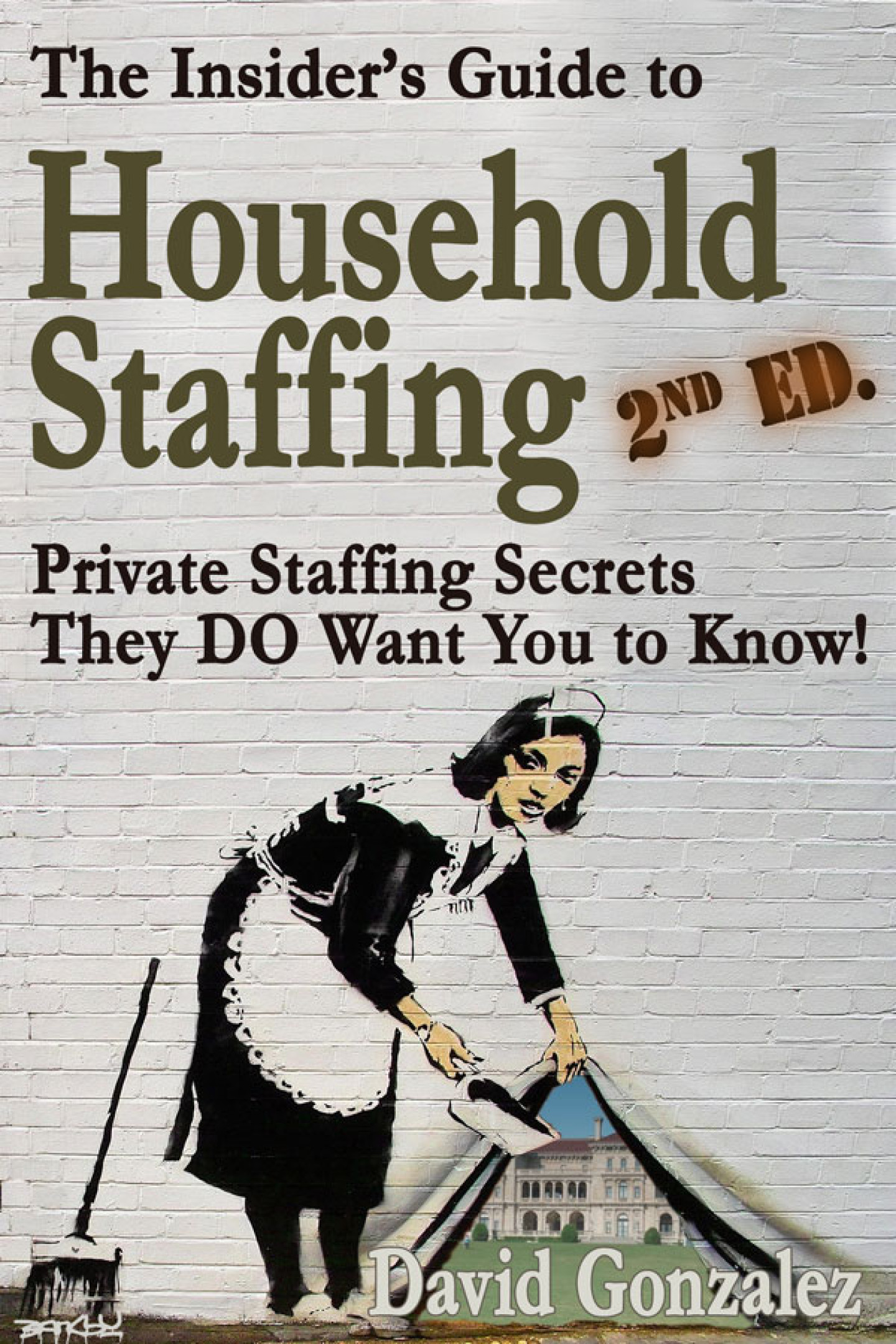When considering a career change, starting out in the domestic field, or finding your next position as a seasoned service pro, there are a few very important considerations. The first and most important is "Why do I want to work in private service?" Second, "What are my immediate and long-term goals in the industry?" And third, "How can I be competitive in the job search process?" Carefully and truthfully answering these questions will dictate how to proceed.
Why?
Many people looking for work in private service for the first time have an incomplete idea of the actual requirements for a position. Titles and job descriptions give some insight into the type of work expected, but the intangible and hidden details are where the true nature of the business is discovered. For example, can you honestly say that after years of building your own career and lifestyle that you now want to focus on the fulfillment of someone else? You need to understand that this is the one goal of service: to provide support for the employer above all. Are you capable of watching your boss spend more money in one day than you make in a year? You must have a disposition that allows for such dramatic realizations. Likewise, although several skills from the business world apply to domestic work, can you spot the little things that create harmony in a luxury lifestyle? Can you be a jack of all trades to assure things get done, no matter what? If so, you may be headed down the right path. If not, look for another direction with your career. The best way to know for sure if you are cut out to handle a domestic position is to ask a veteran. Get in touch with someone you may know in your personal network, or perhaps ask an agency or service association for a referral to a top candidate. You can likely find an event in your local area to attend and meet others already well-established in the field. Most people in the business are proud of what they do and are happy to give you some of their time. This is truly the only way to understand what happens on a day to day schedule, and the best way to know if it is for you.
For those already in the field, you still need to ask the hard questions of yourself. In my own experience I know I am no longer capable of private service as a profession. My years as a Personal Assistant were very dedicated and intensive as a 24/7 live-in employee. I can objectively review the efforts and sacrifices I made both physically and emotionally, and I feel like I’ve used up my ability to give that level of service in the employment arena. I could no longer be content or offer an employer my best while in the direct service role. I’ve considered it seriously over the years and know for sure that I could not be the best employee for the role. You need to assess this for yourself. If you are able to continue performing dedicated, personal service, or if you feel “born to serve,” or perhaps like you have a “true service heart,” then by all means, carry on. Likewise, if upon examination you find even a slight resentment, or a waning level of care for the service or principal, then look elsewhere. There are many other avenues of service oriented professions that may be rewarding for you, and there is no room for anyone bitter, resentful, or tired of high level private service. Remember always that personal service is not about you. You’ll always want to establish a relationship that is equitable, but to be your best you will have to make it “all about them.”
What?
What are your overall goals in the workplace for the next year? The next 3-5 years? The next 10 years? Do you have a plan that you are working toward such as owning your own business, retiring, going to school, etc.? If you know the answers here, you may be able use the domestic industry as your next stepping stone. For example, a domestic couple with some experience, excellent health, and flexibility with relocation can easily earn a salary of $80-120k and have all of their living expenses paid. With some planning and discipline, a 5-10 year stretch can put away enough money to meet some long term goals like starting a venture of your own or taking some time off. On the other hand, a position in private service does little to advance one's corporate career, so beware if that is a future goal. It is important to think a few steps ahead and look at your motivation when entering into or continuing a career in the private sector, because it is such a specialized and unique environment. Of course, if your true intention is to create a long-term career path within the industry, you are in the right place and the right frame of mind. If not, consider other options.
Another stumbling block in the job hunt is being able to prove your dedication. Newcomers and those returning to private service after a long time may find it hard to convince an employer that "this is what I really want to be doing.” Similarly, providers who have been in business for themselves over a long period of time will need a great, convincing story about their return to singular employment. Have a very concise, carefully thought out answer to the question "Why do you want to do this type of work?” Using the specific duties of a position, match your reasons with skills and tasks you have been successful with or exposed to. You should give the impression that you know and can handle the upcoming job duties. In the same vein, having clear, positive reasons for moving forward from your last position is also essential. Framing your choice to find a new position or describing the reason your last role ended with positive statements and future goals is the mark of a service career pro. Either way, once you have it in your head and your heart that you want to do this type of work, it is time to begin searching.
How?
The most asked question of any agency is "How do I find a position?" First, if you made it to this point of the chapter and were honest with yourself all the way, step one, conviction, is complete. Step two is PREPARATION. If you do not read and understand the next chapter, "Becoming a Better Domestic Employment Candidate", you will not be ready to proceed. Before you go any further, you must have the specific tools to be successful. There is a list with detailed explanation in the chapter, so read it carefully and understand each item. Step three is RESOURCES. Not everyone can do it alone. If you are reading this book, you probably are looking for some assistance in the search. Why not? It’s mostly free and those who help you typically will benefit in some way. The following list includes the most likely targets for your job hunting effort.
Agencies:
Get on the phone and get on the internet to gather all the information you can stomach. Call agencies and ask for advice or referrals. Go through a few interview and application processes with them. Make sure to read and understand all the notes for "Working with Domestic Agencies" in this guide so you know the behind the scenes of what to expect. One of the best agency situations is a temporary agency. It will take some legwork to find one that has domestic or combination positions (domestic/executive), but this is one of the best ways to get experience with house management or personal assisting. For example, if you can get a job assisting a busy executive in their office, look for a situation where you can manage the personal duties as well. This includes gift buying, personal errands, pet care, scheduling and overseeing work at the residence, personal travel arrangements, etc. A fantastic resource is called The Job Seeker’s Guide to Private Service Agencies, and is found at http://personaltouchcareerservices.com. A search through EstateJobs.com also offers profiles on many of the agencies posting jobs there.
Publications:
Although classifieds are one of the oldest ways to search, they are also one of the best. Often employers will try their own search before calling an agency and those willing to hire for a "starting" position probably won't use an agency. Check in the papers local to where you want to work and live. Another great feature of classifieds is that for a small fee you can place your own ad looking for the right employment situation. The print version of classifieds has waned in recent years, but the same thoughts now apply to many new online locations that support the same function.
Online:
Since our original guide came out in 2002 there has been exponential growth of online resources for job hunting. Industry specific job boards, agency online listings, and social media have become standard recruiting tools. Along with this relatively new arena come a number of pitfalls, so our advice is to tread carefully. You absolutely must be engaged with these resources in your job search, but you also must have a full understanding of what they can and can’t do, and where you can go terribly wrong in your online activity. Our top recommendation is EstateJobs.com where agencies and private employers post job openings regularly. We built the EstateJobs site ourselves to use in our agency searches and it has grown to become the "go to" resource for job listings in the private service community. Read all instructions carefully and use this free online resource as a part of your job search.
Networking:
If you are good with people, put the word out on the street about what you're looking for. Tell friends, relatives, former employers, etc. and start spreading the news. Most of the positions in the private service industry are filled this way. If you were looking for someone to work with your family and home, wouldn't you ask a trusted friend or associate? Of course you would. Just by getting your name in the right social circles you could end up with an amazing job. And perhaps a good showing will lead you to the next family on a referral from that one, and so on. Many long-time domestic professionals never go through a job hunt and frequently receive offers from friends of their employer. That is the level to aspire to.
Schools:
There are several schools to train you in private service. This is a path for the truly committed, so as before, step one (Conviction) is VERY important here. Schools are fairly expensive and do not guarantee placement upon graduation, but certainly the knowledge, experience, and dedication it takes to complete the courses is a step in the right direction. Also, each school will have a placement service or leads for you to network for a job. (more resources!) Consult with the different programs out there to see if it makes sense for you based on your goals and your finances. Most of them can be found on the internet and you can also inquire through private service forums and social media.
Author’s Note: There are currently several schools throughout The Americas, Europe, and other more remote locations. The main question we are asked about private service schools is “Are they worth it?” There is no short answer to the question, as every individual case needs to be considered in detail, but we have developed some very concise statements in response to those inquiries: 1. If you are enrolling in any educational program for the sole purpose of getting hired in a new job, DON’T DO IT. No matter what anyone says in their sales pitch, there are NO guarantees of employment upon graduation. 2. If you have the time and money, take every course available! Career related education is a hallmark of professionals in any industry, and the quality of available private service education is, in my opinion, excellent. I have personally taken several wonderful courses through one institute, and was on the board of advisors for the curriculum at another great academy. I highly recommend continuing your education in your chosen profession at every opportunity.
In conclusion, a few basics are important to get a job in the private service field: Be sure of what you are after; be prepared for the opportunities; and use all available resources to give yourself a shot at the best possible employment.
For more on this topic and others related to private staffing, get the book! The Insider's Guide to Household Staffing, 2ed. Private Staffing Secrets They DO Want You to Know! Click for more information.






Recent Comments